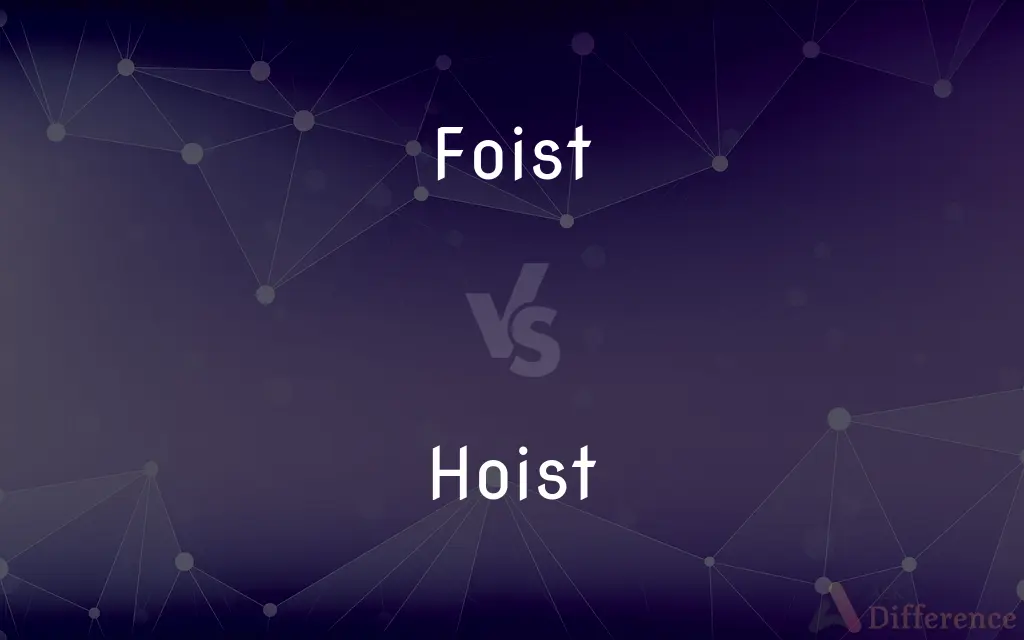Foist vs. Hoist — What's the Difference?
By Fiza Rafique & Maham Liaqat — Updated on April 19, 2024
Foist involves imposing something unwanted on others, usually by deception; hoist refers to lifting or raising something, often with mechanical help.

Difference Between Foist and Hoist
Table of Contents
ADVERTISEMENT
Key Differences
Foist typically implies a deceitful or forceful introduction of something undesirable. Someone might foist counterfeit goods onto unsuspecting buyers. Whereas, hoist involves the physical or mechanical lifting of objects. Workers might hoist a beam into place during construction.
Foist can also suggest the covert insertion of items into a group or collection. A forger might foist a fake manuscript into a batch of authentic ones. On the other hand, hoist is straightforward in its physicality, such as using a crane to hoist heavy equipment to the upper floors of a building.
In a social context, to foist could mean forcing unwanted ideas or responsibilities onto others. A boss might foist extra work onto an already overloaded employee. Conversely, hoist could be used figuratively to elevate someone's status, as in a team hoisting a coach onto their shoulders after a victory.
When foist is used, it often carries a negative connotation, highlighting deceit or unwelcome imposition. Someone may foist their beliefs on others during a discussion. Whereas hoist is typically neutral or positive, focusing on the act of raising or elevating something or someone.
The usage of foist usually involves subtlety and sneakiness in contexts like fraud or deception. A scam artist might foist phony insurance on an elderly couple. On the other hand, hoist is associated with strength and visibility, such as a flag being hoisted during a ceremony.
ADVERTISEMENT
Comparison Chart
Definition
To impose something by deceit
To lift or raise something mechanically
Connotation
Negative, deceptive
Neutral or positive, straightforward
Common Contexts
Fraud, deception
Construction, lifting
Usage in Speech
Subtle, implying dishonesty
Direct, associated with physical strength
Figurative Usage
Imposing unwanted ideas or goods
Elevating status or visibility
Compare with Definitions
Foist
To pass off slyly or secretly.
The con artist foisted counterfeit money into the cash register.
Hoist
To raise in rank, condition, estimation etc.
She was hoisted to the position of CEO after the merger.
Foist
To introduce or insert fraudulently or deceitfully.
He tried to foist the fake document into the official records.
Hoist
To lift an object to a higher position.
They hoisted the flag at dawn.
Foist
To impose something unwanted upon someone.
She was foisted with the responsibility for the mistakes of her team.
Hoist
To lift or raise to one's lips using one's arms.
He hoisted his drink in a celebratory toast.
Foist
To manage to place secretly or by force.
He foisted his own artworks into the famous gallery.
Hoist
To elevate the physical position of someone or something.
The crowd hoisted the hero onto their shoulders.
Foist
To shift something unwanted onto someone else.
The company tried to foist old technology onto its customers.
Hoist
To raise or lift, especially by some mechanical appliance.
The workers hoisted the steel beams to the top of the building.
Foist
To pass off as genuine, valuable, or worthy
"I can usually tell whether a poet ... is foisting off on us what he'd like to think is pure invention" (J.D. Salinger).
Hoist
To raise or haul up, often with the help of a mechanical apparatus.
Foist
To impose (something or someone unwanted) upon another by coercion or trickery
They had extra work foisted on them because they couldn't say no to the boss.
Hoist
To raise to one's mouth in order to drink
Hoist a few beers.
Foist
To insert fraudulently or deceitfully
Foisted unfair provisions into the contract.
Hoist
To become raised or lifted.
Foist
(transitive) To introduce or insert surreptitiously or without warrant.
Hoist
An apparatus for lifting heavy or cumbersome objects.
Foist
(transitive) To force another to accept especially by stealth or deceit.
Hoist
The act of hoisting; a lift.
Foist
(transitive) To pass off as genuine or worthy.
Hoist
The height or vertical dimension of a flag or of any square sail other than a course.
Foist
A thief or pickpocket.
Hoist
A group of flags raised together as a signal.
Foist
(obsolete) A light and fast-sailing ship.
Hoist
(transitive) To raise; to lift; to elevate (especially, to raise or lift to a desired elevation, by means of tackle or pulley, said of a sail, a flag, a heavy package or weight).
Foist
(obsolete) A cask for wine.
Hoist
To lift a trophy or similar prize into the air in celebration of a victory.
Foist
Fustiness; mustiness.
Hoist
To lift someone up to be flogged.
Foist
A light and fast-sailing ship.
Hoist
(intransitive) To be lifted up.
Foist
A foister; a sharper.
Hoist
To extract (code) from a loop construct as part of optimization.
Foist
A trick or fraud; a swindle.
Hoist
To steal.
Foist
To insert surreptitiously, wrongfully, or without warrant; to interpolate; to pass off (something spurious or counterfeit) as genuine, true, or worthy; - usually followed by in.
Lest negligence or partiality might admit or foist in abuses and corruption.
When a scripture has been corrupted . . . by a supposititious foisting of some words in.
Hoist
To rob.
Foist
To force onto another;
He foisted his work on me
Hoist
A hoisting device, such as pulley or crane.
Foist
Insert surreptitiously or without warrant
Hoist
The act of hoisting; a lift.
Give me a hoist over that wall.
Hoist
The triangular vertical position of a flag, as opposed to the flying state, or triangular vertical position of a sail, when flying from a mast.
Hoist
The position of a flag (on a mast) or of a sail on a ship when lifted up to its highest level.
Hoist
The position of a main fore-and-aft topsail on a ship and fore fore-and-aft topsail on a ship.
Hoist
To raise; to lift; to elevate; esp., to raise or lift to a desired elevation, by means of tackle, as a sail, a flag, a heavy package or weight.
They land my goods, and hoist my flying sails.
Hoisting him into his father's throne.
Hoist
That by which anything is hoisted; the apparatus for lifting goods.
Hoist
The act of hoisting; a lift.
Hoist
The perpendicular height of a flag, as opposed to the fly, or horizontal length when flying from a staff.
Hoist
Hoisted.
'T is the sport to have the enginerHoist with his own petar.
Hoist
Lifting device for raising heavy or cumbersome objects
Hoist
Raise or haul up with or as if with mechanical help;
Hoist the bicycle onto the roof of the car
Hoist
Move from one place to another by lifting;
They hoisted the patient onto the operating table
Hoist
Raise;
Hoist the flags
Hoist a sail
Common Curiosities
Are there any synonyms for "foist"?
Yes, synonyms for "foist" include impose, thrust, and palm off.
What does "hoist with his own petard" mean?
This phrase means to be harmed by one's own plan intended to harm someone else; it uses "hoist" to indicate being blown up by one's own bomb.
Can "foist" ever have a positive connotation?
Rarely, as "foist" typically connotes deception or imposition, but it might be seen positively if it leads to unexpected beneficial outcomes.
How is "hoist" used in engineering?
In engineering, "hoist" refers to the act or device for lifting heavy materials, often using a cable or pulley system.
What is the origin of the word "foist"?
"Foist" originated from the Dutch word "vuisten," meaning to take into one's hand, evolving to imply deceitful handling.
Can "hoist" be used in maritime contexts?
Yes, "hoist" is commonly used in maritime contexts to describe the lifting of sails or flags on a ship.
What is a common example of foisting in everyday life?
A common example is when marketers foist unnecessary products on consumers through misleading advertising.
What are the implications of being foisted upon in a business environment?
Being foisted upon in business can lead to taking on unwanted responsibilities or accepting subpar projects, which may affect job satisfaction and performance.
What is the difference in grammatical usage between "foist" and "hoist"?
"Foist" is used more abstractly for concepts and impositions, while "hoist" is used physically for lifting and raising objects or figuratively for elevating status.
What would be an example of foisting in politics?
An example would be a politician foisting unpopular policies onto citizens without proper consultation or transparency.
Is there a physical tool associated with the act of hoisting?
Yes, tools such as cranes, hoists, and pulleys are typically used for hoisting objects.
Can "foist" be used in legal terms?
Yes, in legal terms, "foist" might be used to describe the imposition of fraudulent contracts or obligations.
Is there a sports context where "hoist" is used?
Yes, in sports, "hoist" is often used metaphorically, like hoisting a trophy, indicating lifting it as a sign of victory.
How do cultural perceptions of "foist" and "hoist" differ?
Cultural perceptions might view "foist" as cunning or sly behavior, while "hoist" is often seen as a sign of strength and capability in physical tasks.
How does "hoist" relate to medical or rescue operations?
In such operations, "hoist" refers to lifting patients or injured individuals, often using helicopters or rescue cranes.
Share Your Discovery

Previous Comparison
Mitigate vs. Reduce
Next Comparison
Nib vs. NipAuthor Spotlight
Written by
Fiza RafiqueFiza Rafique is a skilled content writer at AskDifference.com, where she meticulously refines and enhances written pieces. Drawing from her vast editorial expertise, Fiza ensures clarity, accuracy, and precision in every article. Passionate about language, she continually seeks to elevate the quality of content for readers worldwide.
Co-written by
Maham Liaqat














































